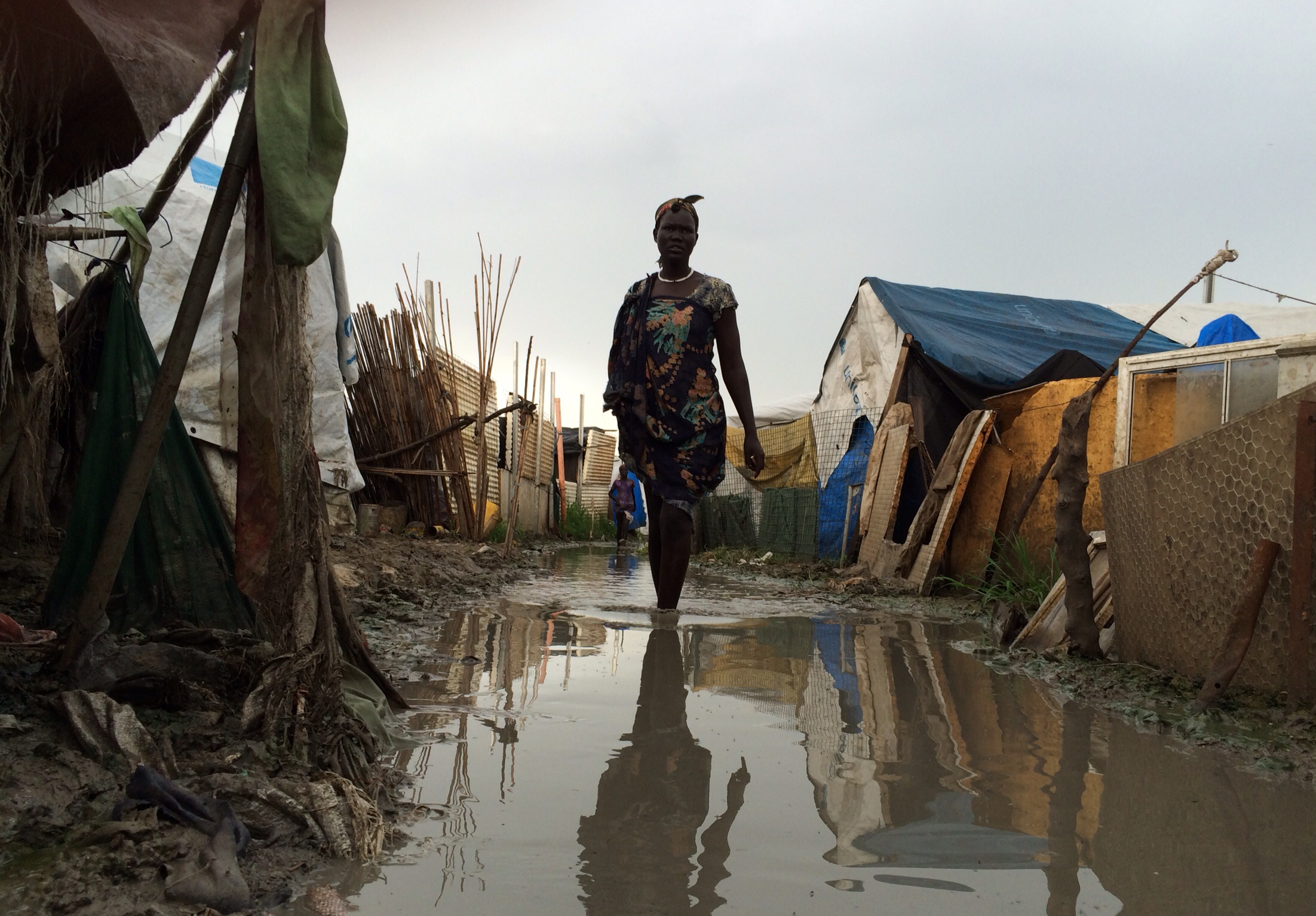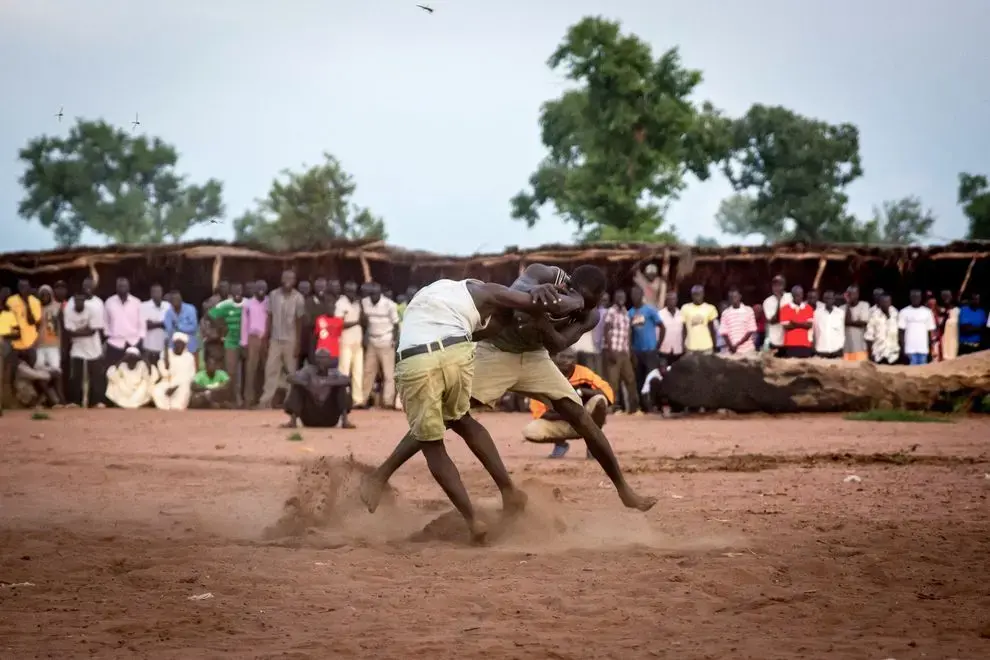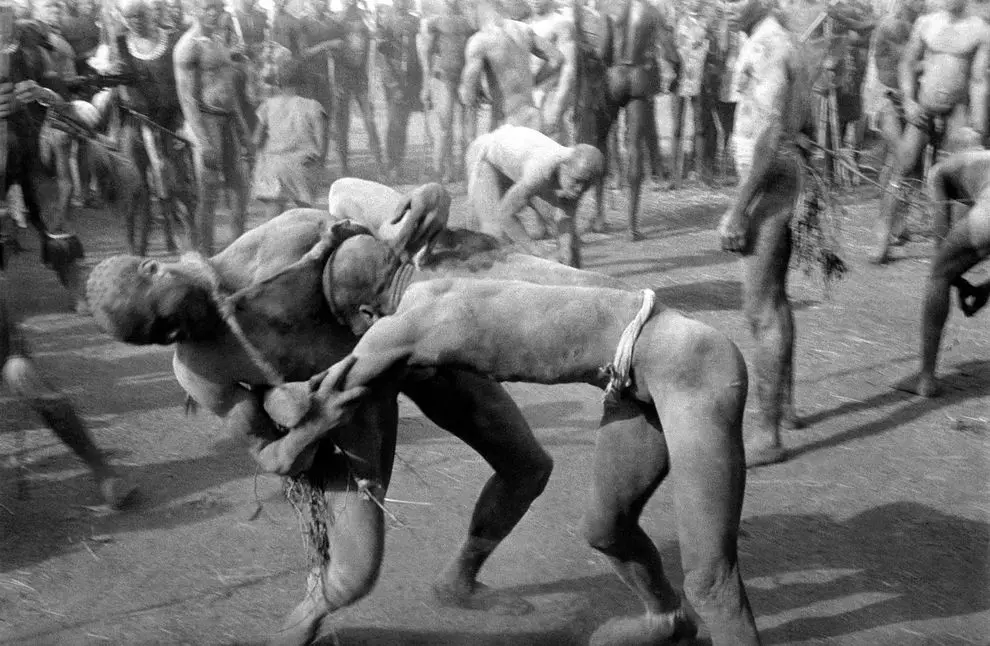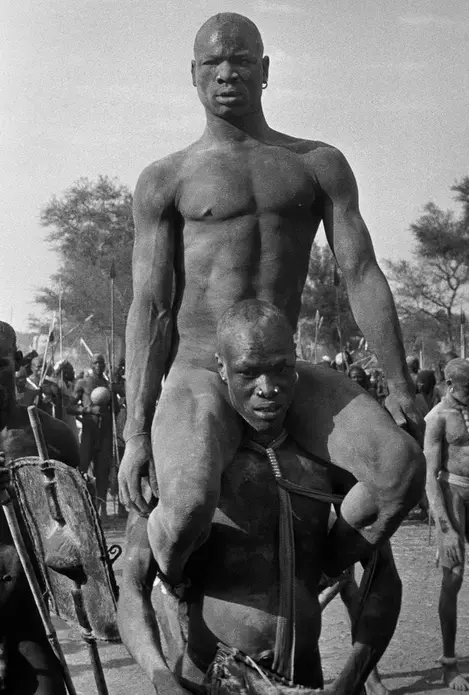The crowd is already fired up by the time Zeber Reka Mahmoud gets into the ring.
He's been strutting up and down the sidelines, flexing his muscles and mouthing off to his opponent's fans. So when the referee finally blows the whistle, and the two hulking wrestlers lunge into a violent embrace, the sea of spectators goes wild.
The bulky teenagers trade blows to the head and grope for the backs of each other's knees. They lock arms, twisting and pirouetting in the dust. Then, as the energy of the crowd builds to a crescendo, Zeber slings his opponent skyward and drives him into the ground.
On the sidelines, where some 5,000 people from the Nuba Mountains of Sudan have gathered, all hell breaks loose.
"Wrestling is in my blood," Zeber says after the match, still breathing heavily and dotted with perspiration. "My father taught me, and his father taught him. Wrestling is in the blood of the Nuba."
Few cultural practices match the importance of wrestling to the people of the Nuba Mountains, where the Sudanese government has been conducting a brutal counterinsurgency campaign since 2011. (See "How the World's Youngest Nation Descended Into Bloody Civil War.")
And now that tens of thousands of Nubans have taken refuge in neighboring South Sudan—after three years of fighting, the Yida camp alone houses more than 70,000—wrestling is one of the only rituals that ties them to their old life in the mountains.
Darfur II?
That life came under attack three years ago, when a disputed election in South Kordofan (the Sudanese border state where the Nuba Mountains are located) catalyzed a rebellion against the Sudanese government—and a scorched-earth response from Khartoum. (See "Q&A: Doctor Describes How Sudanese Bombers Terrorized Hospital.")
The violence had been a long time coming. Nubans fought alongside the south for much of the Second Sudanese Civil War, from 1983 until 2005, but were left north of the border when the southerners finally voted for independence in January 2011. (See photos of southern Sudan.)
As part of the peace agreement that ended that war, the residents of the Nuba Mountains, as well as those of another disputed region in Sudan's Blue Nile state, were supposed to get a say in how they're governed. But by the time the first shots rang out in June 2011, it was clear that wouldn't come to pass. (Related: "'Lost Boy' John Bul Dau: Stop War, Killing in South Sudan.")
According to Mukesh Kapila, a former high-ranking U.N. official in Sudan who was among the first to raise the alarm about the genocide in Darfur, the people of both the Nuba and Blue Nile regions were "badly cheated" after the southern referendum went ahead and the international pressure on Khartoum dissipated.
The violence that ensued bears an uncomfortable resemblance to the horrors that played out in Darfur in the middle 2000s (and which continue today, albeit at a less intense level). Bombardment of civilians, coordinated attacks by heavily armed militias, the denial of humanitarian aid—they've all been repurposed for the conflict in South Kordofan.
"What you have in the Nuba Mountains now is not just a repeat of Darfur," says Kapila, "but Darfur on a grander scale." (Read about famine in South Sudan.)
Life During Wartime
In the refugee camp in Yida, it's difficult to find someone who hasn't seen the horrors of this conflict up-close.
Suzanne Filimone, a 27-year-old mother who fled to Yida after her family's village in the western Nuba Mountains was bombed last year, says she still has panic attacks for no apparent reason.
"Sometimes when I am sitting, I will just start up running," she says. "Sometimes I faint."
When a barrel bomb dropped by a Sudanese Antonov plane ripped through the marketplace in her village last year, killing several children and leaving others badly maimed, Filimone says her son got on his bicycle and pedaled frantically for miles until he crashed and broke his arm.
"Insanity is like a disease that falls from the sky," she told me. "We all slowly become crazy waiting for the bombs."
Even the wrestlers—who, like teenagers everywhere, expend a great deal of energy trying to look tough—cannot hide what the killing has done to them inside.
"I have seen people's legs cut off, their heads severed by exploding bombs," said Zeber, shaking his head and fiddling with his massive, chalk-covered hands.
The Cultural Glue of Grappling
Out on the dusty wrestling pitch in the waning sunlight hours, the residents of Yida seem to let thoughts of war go for a few precious moments. The combat is sometimes slow, sometimes frantic. The audience participation is total.
At one point, a tribal elder charges onto the pitch to rev up the crowd. "These are my bulls!" he shouts, gesturing to the gaggle of muscle-bound youngsters waiting for a chance to test their mettle. He mimes a pair of bull horns in the air atop his head. The crowd roars its approval.
For thousands of years, ritualized hand-to-hand combat has been a fixture of life for the dozens of distinct tribes that constitute the Nuba. The individual customs vary among communities—some hold elaborate tournaments to mark the planting or harvest seasons; others wrestle as part of wedding celebrations—but the common practice is part of the cultural glue that holds the Nuba together.
"Wrestling seems to be the identity of the Nuba," Yacoub Osman, a former wrestler and the chairman of the local Sudanese Refugee Council, told me when I visited him at his ramshackle headquarters in Yida. "It is the one thing that unites all of the tribes."
Then and Now
Outside the remote mountain villages where it developed, this ancient tradition itself has evolved. In fact, the scene in Yida today might be unrecognizable to those familiar with George Rodger's iconic images of Nuba wrestlers, published in 1952 in National Geographic magazine, or from Leni Riefenstahl's much-maligned coffee-table book that appeared two decades later.
Wrestlers no longer fight naked, covered in ash, or soaked in grip-resistant cow butter. The uniform of today's wrestling champion is athletic shorts and a sleeveless white T-shirt.
Zeber, whose undefeated record has earned him celebrity status here in Yida, is nicknamed John Cena, after the American actor and World Wrestling Entertainment icon.
But "wrestling like [Cena performs in the WWE] is not wrestling," Osman told me when I asked him about the evolution of the sport. "It has lost the meaning."
Osman says things started to change in the late 1960s, when he was a young wrestler. That's when the government in Khartoum began to disrupt the Nuba traditional way of life by implementing large, mechanized agricultural schemes, almost always administered by outsiders. A brutal campaign of forced Arabization and Islamization followed, and Nuba traditions like wrestling and brewing beer were either banned or altered to fit the government's tastes.
"The regime says [wrestling] naked is backwards," said Osman. "It is not marching with Islamic [teachings]."
By the time war broke out again in 2011, wrestling as George Rodger knew it no longer existed. Today it's changing even faster, as Nuba wrestlers access the Western world via satellite link. Now more than ever, it must compete with other demands of modern life.
A Better Tomorrow?
Nourdeem Mustafa al-Nour, who has wide cheekbones and a wisp of a goatee, says he doesn't want to be wrestling this time next year.
"I am trying to go to school, so hopefully someday I will have no time for wrestling," he says. "When I study English, it will open my mind so that I can do anything—like become a doctor. Why not?"
As he spoke, a cloud seemed to pass over his face. Above us, an Antonov plane had rumbled into earshot. This one would not bomb us—although this camp has been bombed in the past—but instead did a lazy half-circle before heading toward rebel-held territory in South Sudan.
"But I will fight if I need to," al-Nour said as the plane disappeared over the horizon. "You cannot even wrestle when you are living under threat."














